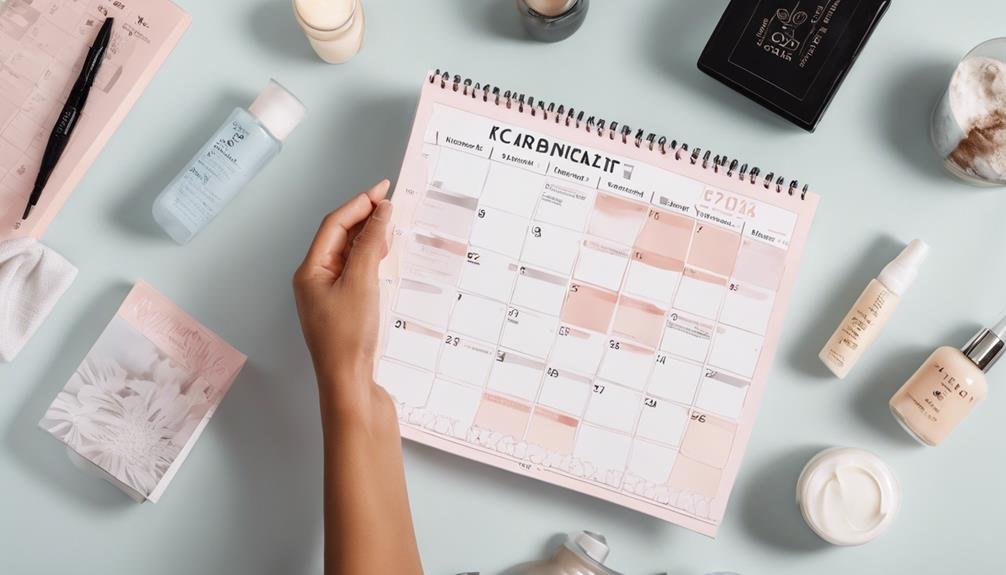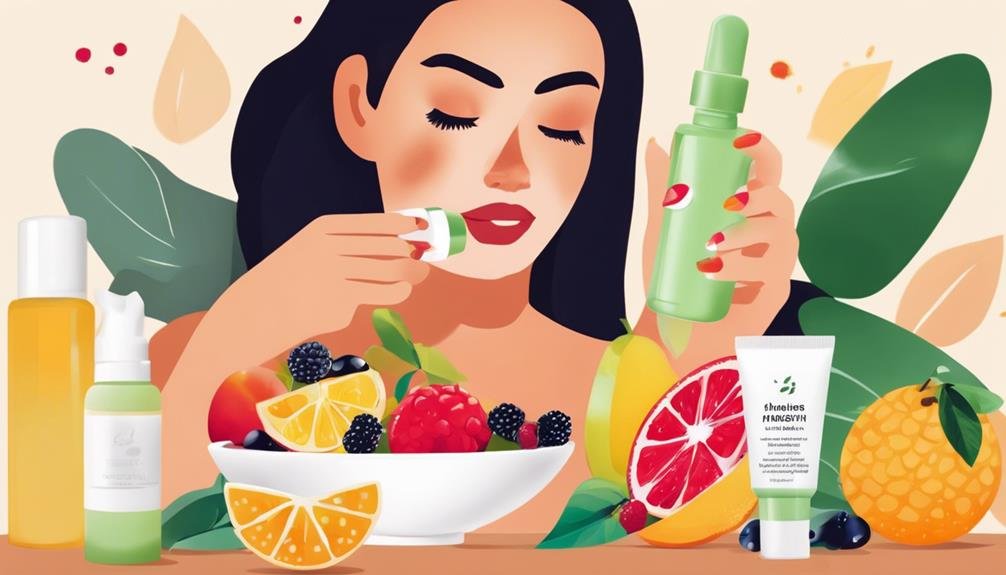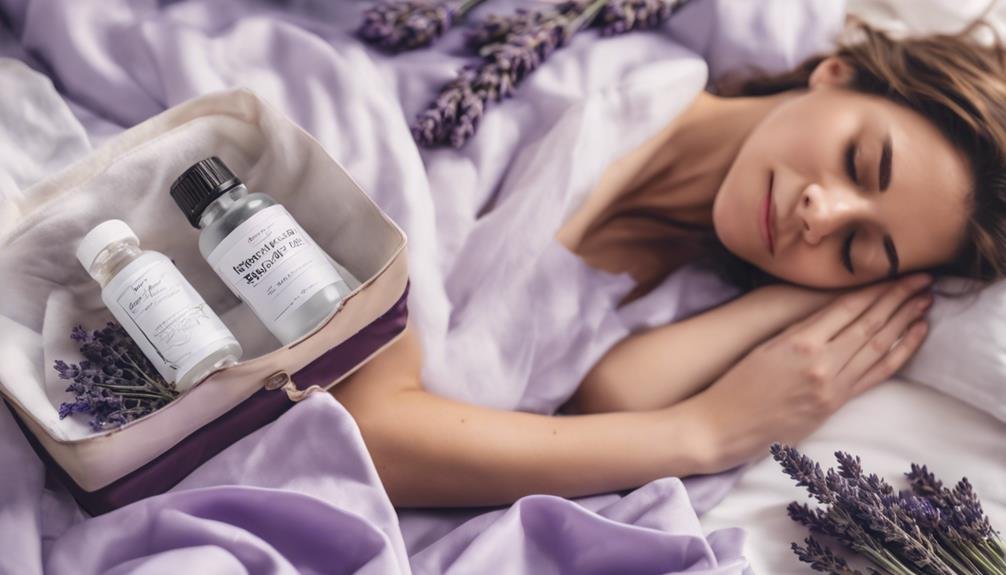If you've ever struggled with hormonal acne, you know how frustrating it can be to find the right skincare routine. But what if a few simple tweaks could make a world of difference? From the products you use to the foods you eat, there are specific steps you can take to help balance your skin and reduce breakouts. Ready to take control of your skin and unlock the secrets to clearer, healthier-looking skin?
Establishing a Consistent Routine
When it comes to maintaining healthy and radiant skin, establishing a consistent routine is key. Morning and evening routines play different roles in skincare.
In the morning, focus on cleansing to remove impurities accumulated overnight and applying products with antioxidants and SPF to protect against environmental damage. Product layering techniques are crucial during the day to ensure optimal absorption and effectiveness of each product.
In the evening, your skin goes into repair mode, making it the perfect time for treatments like serums and creams with active ingredients such as retinol for rejuvenation. Layering products correctly at night can enhance their benefits and help address specific skin concerns like aging or acne.
Understanding Your Skin Type
To properly care for your skin, it's essential to first understand your skin type. Knowing whether you have dry, oily, combination, sensitive, or normal skin will help you tailor your skincare routine effectively. Here are some key points to help you determine your skin type:
- Dry Skin: If your skin feels tight, flaky, or rough, you likely have dry skin. Look for moisturizers with ingredients like hyaluronic acid or shea butter for intense hydration.
- Oily Skin: Shiny skin, enlarged pores, and frequent breakouts are common signs of oily skin. Opt for oil-free products and those containing salicylic acid to control excess oil.
- Combination Skin: If you have an oily T-zone but dry cheeks, you probably have combination skin. Use gentle cleansers and lightweight moisturizers to balance both areas.
- Sensitive Skin: Irritation, redness, or itchiness indicate sensitive skin. Choose products labeled hypoallergenic and fragrance-free to avoid potential reactions.
For those seeking natural solutions, DIY remedies like honey masks for dry skin or clay masks for oily skin can be beneficial. Remember, understanding your skin type is the first step towards achieving healthy and radiant skin.
Hydrating Inside and Out
Maintaining proper hydration is crucial for healthy skin. Ensuring your body is well hydrated not only benefits your overall health but also significantly impacts the appearance and texture of your skin. Adequate dietary hydration and external moisturization work hand in hand to keep your skin looking radiant and youthful.
Tips for Hydrating Inside and Out
Here are some essential tips to help you hydrate your skin from within and externally:
| Dietary Hydration | External Moisturization |
|---|---|
| – Drink plenty of water throughout the day. | – Use a hydrating moisturizer suited for your skin type. |
| – Include hydrating foods in your diet, such as fruits and vegetables. | – Apply moisturizer immediately after showering to lock in moisture. |
| – Limit caffeine and alcohol intake, as they can dehydrate your skin. | – Consider using a facial mist throughout the day to refresh and hydrate your skin. |
Sun Protection Is Key
Proper sun protection is essential for maintaining healthy and youthful skin. Exposure to the sun's harmful UV rays can lead to premature aging, dark spots, and an increased risk of skin cancer. To protect your skin effectively, follow these tips:
- Sunscreen Application: Apply a broad-spectrum sunscreen with an SPF of 30 or higher every day, even on cloudy days. Reapply every two hours or immediately after swimming or sweating.
- Protective Clothing: Wear hats with wide brims, sunglasses with UV protection, and clothing that covers your skin. Dark-colored, tightly woven fabrics offer better protection.
- Seek Shade: Limit your time in direct sunlight, especially between 10 a.m. and 4 p.m. when the sun's rays are strongest.
- Avoid Tanning Beds: Tanning beds emit harmful UV radiation that can damage your skin and increase the risk of skin cancer. Opt for self-tanning products for a safer glow.
Incorporating Antioxidants
Shielding your skin from the sun's harmful rays is just the first step in a comprehensive skincare routine. Incorporating antioxidants into your daily regimen can provide a multitude of benefits for your skin. Antioxidants help combat free radicals, which can cause premature aging and skin damage. These powerful compounds offer skincare benefits such as reducing inflammation, promoting collagen production, and improving overall skin tone and texture.
To reap the antioxidant benefits, include top antioxidant sources in your diet. Berries like blueberries, strawberries, and raspberries are excellent choices, as well as fruits such as oranges and grapes. Vegetables like spinach, kale, and broccoli are also rich in antioxidants.
Green tea, nuts, seeds, and dark chocolate are additional options to consider incorporating into your meals or snacks.
Regular Exfoliation for Renewal
To effectively renew your skin and maintain a healthy complexion, regular exfoliation is a crucial step in your skincare routine. Exfoliating helps to remove dead skin cells, unclog pores, and reveal fresh, radiant skin. Here are some exfoliating techniques and the benefits of exfoliation:
- Physical Exfoliation: Using scrubs or tools like brushes to physically remove dead skin cells.
- Chemical Exfoliation: Utilizing acids like AHAs, BHAs, or enzymes to dissolve dead skin cells.
- Gentle Exfoliation: Opt for products with fine particles or low acid concentrations to avoid irritation.
- Consistent Exfoliation: Regular exfoliation promotes cell turnover, leading to smoother, brighter skin.
Exfoliation aids in improving skin texture, reducing breakouts, and enhancing the absorption of other skincare products. By incorporating exfoliation into your routine 1-3 times a week, you can achieve a more youthful and glowing complexion. Remember to follow up with hydrating and protective skincare to maintain the benefits of exfoliation.
Prioritizing Sleep and Stress Management
Prioritizing adequate sleep and effective stress management are foundational pillars of a holistic approach to skincare for women. Sleep hygiene plays a crucial role in skin health as during deep sleep, the body boosts blood flow to the skin, allowing it to repair and regenerate. Aim for 7-9 hours of quality sleep each night to promote a radiant complexion and reduce signs of aging. Establish a relaxing bedtime routine, limit screen time before bed, and create a comfortable sleep environment to optimize your rest.
Additionally, stress reduction is paramount for maintaining healthy skin. Chronic stress can exacerbate skin conditions such as acne, eczema, and psoriasis. Engage in activities that promote relaxation, such as meditation, yoga, or deep breathing exercises. Prioritize self-care practices and set boundaries to manage stress levels effectively.
Frequently Asked Questions
Can I Use Skincare Products Designed for Men?
Yes, you can use skincare products designed for men. Gender-specific products may have different marketing, but efficacy depends on skin sensitivity and ingredients. Check for harsh ingredients that may not suit your skin.
How Can I Treat Hormonal Acne Effectively?
When battling hormonal acne, it's like tending a delicate garden. Nurture your skin by making dietary changes, taking supplements, balancing hormones, and following a tailored skincare routine. Consistency and patience will yield beautiful results.
Is It Necessary to Use Different Products for Day and Night?
You should consider using different products for day and night. Day products focus on protection and hydration, while night products prioritize skin repair with ingredients like retinol. This product compatibility and ingredient differences can maximize your skin's benefits.
Can Stress Really Impact My Skin's Health?
Feeling stressed can indeed impact your skin's health. Stress management is crucial for maintaining a healthy complexion. High stress levels can trigger inflammation, breakouts, and accelerate aging. Prioritize self-care practices to support your skin's wellbeing.
What Are Some Common Mistakes to Avoid in Skincare Routines?
You should avoid over exfoliating or incorrectly layering products, skipping sunscreen, and using expired products in your skincare routine. These mistakes can harm your skin's health and compromise the effectiveness of your skincare products.
Conclusion
In the journey towards healthy skin, think of your skincare routine as a garden. Just like tending to plants with consistency, understanding your skin type is like knowing the soil quality. Hydrating from the inside out is like watering your garden, while sun protection acts as a shield from harsh weather. Incorporating antioxidants is like feeding your plants nutrients, and regular exfoliation is like pruning for new growth. Remember, taking care of your skin is like nurturing a beautiful garden – with patience and dedication, you'll see it flourish.






